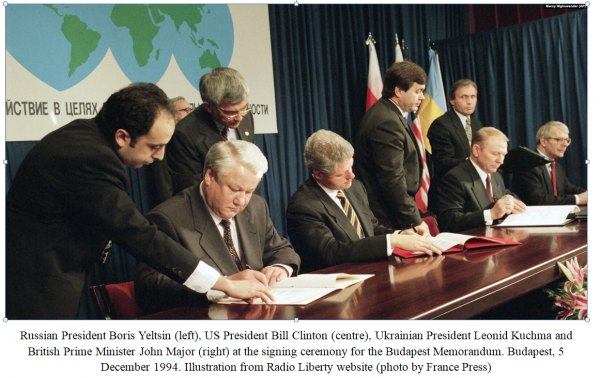A Response to Sergey Lavrov, or Why the Budapest Memorandum is the Key and the Only Possible Platform for Restoring the System of International Law and Legal Order. The alternative is an inevitable slide into a Third World War
"The system of international law is upheld through mutual recognition of the foundations and principles which, regardless of their metaphysical origins, function in practice as rules of the game. The eloquent statement pacta sunt servanda (Latin: 'agreements must be kept') effectively contains the assertion that the integrity of the system is based solely on the will to participate jointly in a common game. As soon as one of the parties ceases to abide by the rules, the entire system of international law collapses (even if only temporarily)." (Johan Huizinga, Dutch historian and philosopher)
On 26 October 2025, in an interview with the Hungarian YouTube channel Ultrahang, Russian Foreign Minister Sergey Lavrov said: "It (the Budapest Memorandum) states that Ukraine, like other former Soviet republics that have renounced nuclear weapons, will receive guarantees that nuclear states provide to non-nuclear states. That's all. That's all. These guarantees state that nuclear weapons will not be used against non-nuclear states that are parties to the Treaty on the Non-Proliferation of Nuclear Weapons." (https://www.pravda.com.ua/news/2025/10/26/8004537/)
No, that's not all. The Russian minister is traditionally disingenuous, citing selective facts, concealing the truth and manipulating international law. The truth is that, in addition to nuclear safety guarantees, Ukraine was also given the following commitments under Article 2 of the Memorandum: "The Russian Federation, the United Kingdom of Great Britain and Northern Ireland, and the United States of America reaffirm their obligation to refrain from the threat or use of force against the territorial integrity or political independence of Ukraine, and that none of their weapons will ever be used against Ukraine..." To resolve issues arising from violations of guarantees and obligations, this international agreement also established a platform for diplomatic settlement and negotiations among the signatory countries. According to Article 6: "Ukraine, the Russian Federation, the United Kingdom of Great Britain and Northern Ireland, and the United States of America shall consult in the event a situation arises that raises questions concerning these commitments." In other words, expansion of the format is possible, with China and France immediately joining the Memorandum, but narrowing it beyond the signatory countries is not. This is in terms of the fulfilment of guarantees and obligations under the treaty for Ukraine.
Sergey Lavrov's statements lead to only one conclusion: another attempt by the Kremlin to justify its aggression against Ukraine and, through selective manipulation of international law, to destroy not only its statehood and people, but also the existing system of international law and international legal order.
"It is not enough to simply dream of winning the lottery; you must also purchase at least one lottery ticket at least once in your life... If the victim refuses to file a lawsuit and go to court, even perfect laws and law enforcement agencies are powerless to help them."
It is well known that politicians around the world tend to shift the blame for their own selfishness, cowardice, inaction, incompetence and professional ignorance onto the 'imperfection' of laws and international treaties.
The most painful case for Ukraine is the Budapest Memorandum. It is a valid international treaty that guarantees the state sovereignty, territorial integrity, and security of Ukraine.
The memorandum was concluded in full compliance with the Vienna Convention on the Law of Treaties of 1969. It unconditionally requires compliance with its provisions, in accordance with the current system of international law that has developed since the end of World War II.
As in the case of domestic legislation, in the event of a violation of the provisions and conditions of an intergovernmental treaty, the interested party whose rights have been violated must officially appeal to the international authorities and the violating states, demanding the restoration of its rights.
However, since Russia's annexation of Crimea and its armed aggression against Ukraine in 2014, Ukraine's political leadership has failed to address the guarantor states (all five member states of the UN Security Council with permanent representation) with official diplomatic notes and in the form prescribed by legal protocols, regarding the fulfilment of their obligations under the Memorandum. Nor have they requested that Russia's voting rights in the UN Security Council be suspended as a party to the armed conflict and aggressor in the war against Ukraine.
Instead of the above-mentioned, nearly the entire information space – including that of Ukraine – has been dominated by Kremlin-driven disinformation narratives about the alleged "nullity of the Budapest Memorandum," the absence of specific security guarantees in the text of the international agreement, and the "emptiness of the paper," which is directly refuted by the specifics and logic of each point of the treaty itself and the entire Chapter VII of the UN Charter.
Even if certain Western leaders lack honour, dignity and responsibility for preserving peace on the planet, this does not exempt them from future judgement by history. The Ukrainian leadership is not exempt from its duty to protect its territorial integrity and sovereignty through diplomatic means, using the only 'trump card' it has in any peace negotiations – the Budapest Memorandum.
On 19 October 2025, Gunther Krichbaum, State Minister for European Affairs at the German Foreign Office, reiterated this point: "We must remember that there was the Budapest Memorandum, in which Russia recognised the integrity and sovereignty of Ukraine in exchange for the withdrawal of nuclear weapons. What has now happened to this agreement has not been forgotten."
Today, Russia has effectively destroyed the existing international legal order, which had ensured peace in Europe for 70 years after the end of the Second World War.
By annexing Ukraine's Crimea in 2014, Russia violated a number of multilateral international agreements to which it was a party, including the UN Charter, the 1975 Helsinki Act and the 1994 Budapest Memorandum.
The first two international treaties mentioned above define the basic principles of international law: the inviolability of borders, the territorial integrity of states, the faithful fulfilment by states of their obligations, refraining from the threat or use of force, and non-interference in matters that fall within the domestic jurisdiction of any state.
The third international agreement – the Budapest Memorandum – between Russia, the United States, Great Britain, France, and China provided Ukraine with guarantees of its security and territorial integrity in exchange for its commitment to renounce nuclear weapons and to join the Treaty on the Non-Proliferation of Nuclear Weapons as a non-nuclear state.
Following a joint appeal by the signatory countries to the UN General Assembly and the Security Council, the Memorandum was registered as an international treaty – an official document of the UN General Assembly and the Security Council.
That joint statement bears the signature of the current Russian Foreign Minister, Sergey Lavrov, who was Russia's Permanent Representative to the United Nations in 1994.
At the request of the signatory countries, the text of the Budapest Memorandum was included in the agenda of the regular session of the UN Security Council in 1995 and distributed as an official document of the UN Security Council. According to the 1969 Vienna Convention on the Law of Treaties, it is a full-fledged international treaty and is binding on all parties that have signed it.
According to the 1994 Budapest Memorandum, the signatory states – permanent members of the UN Security Council – not only reaffirmed their commitment to respect Ukraine's sovereignty and existing borders, but also to 'refrain from the threat or use of force against the territorial integrity or political independence of Ukraine.'

By signing the Budapest Memorandum on 5 December 1994, Ukraine voluntarily renounced the world's third-largest arsenal of nuclear weapons. To this day, Ukraine remains the only country in the world that has made the largest global contribution to nuclear disarmament, thereby strengthening peace and international security on our planet. Following Russia's brutal violation of the Budapest Memorandum and the unwillingness of other nuclear signatory states to ensure the effectiveness of international law and Ukraine's security guarantees, no country in the world will ever again make such a contribution to strengthening the security of others at the expense of its own security.
Former US Republican Senator John McCain noted back in 2014: "America should have acted on the Budapest Memorandum long ago. He also added that from now on, it will be more difficult to negotiate with "nuclear" states to give up their nuclear weapons. It is quite obvious that the agreements of the Budapest Memorandum, which were supposed to guarantee the complete territorial integrity of Ukraine, including Crimea, have been completely violated.
(https://www.radiosvoboda.org/a/26567259.html)
By violating the Budapest Memorandum, Russia has undermined the effectiveness of the Treaty on the Non-Proliferation of Nuclear Weapons (NPT). In the event of non-compliance with the Budapest Memorandum and failure to provide real security guarantees to Ukraine, Ukraine has the right to withdraw from this treaty. Both treaties are interrelated for Ukraine (the full name of the Budapest Memorandum is the Memorandum on Security Assurances in Connection with Ukraine's Accession to the Treaty on the Non-Proliferation of Nuclear Weapons). Ukraine's withdrawal from this treaty will, de facto, spell its demise. Then no country in the world would ever exchange possession or the possibility of possessing nuclear weapons in exchange for any security guarantees, and would not accede to this agreement.
Therefore, it is clear that the effectiveness of any new future agreements in the field of disarmament and non-proliferation of nuclear weapons will depend entirely on the implementation of previously signed agreements. First of all, this applies to Ukraine, the world leader in terms of nuclear disarmament, and therefore to the implementation of the Budapest Memorandum. Failure to implement it, especially by the world's democratic countries, is a blow to the image of all democratic countries. It also undermines the entire system of international law, which is based on the 1969 Vienna Convention on the Law of Treaties.
By violating the Budapest Memorandum and Ukraine's borders, Russia has launched a 'domino effect' that could destroy all borders in Europe. These are the borders established after the end of World War II, whose inviolability was confirmed in 1975 in Helsinki. Ukraine's failure to return to its legally recognised borders is tantamount to recognising the Helsinki Accords as a 'house of cards', which any country can now destroy in relation to its neighbour, as long as it has the power to do so.
On 3 March 2025, Polish President (1990-1995) Lech Wałęsa and former Polish dissidents addressed US leader Donald Trump with a statement in support of Ukraine: "We call on the United States to fulfil the guarantees it gave together with the United Kingdom in the 1994 Budapest Memorandum, which explicitly states the commitment to defend the integrity of Ukraine's borders in exchange for its renunciation of its nuclear stockpiles. These guarantees are unconditional: there is no mention of interpreting such assistance as an economic exchange. ] (https://www.istpravda.com.ua/columns/2025/03/3/164779/)
The only platform for peace talks can be the format of the signatory countries to the Budapest Memorandum.
Unconditional confirmation of security guarantees to Ukraine under the Budapest Memorandum and its supplemental agreement. Russia's gross violation of the Budapest Memorandum and the incomplete implementation of its provisions by other signatories require that the Additional Agreement to the Memorandum establish a step-by-step, time-bound mechanism to implement the guarantees provided for in the Memorandum, thereby preventing new aggression against Ukraine. This detailed mechanism could be provided by the nuclear signatories to the Memorandum, if they agree, and by new countries or alliances of countries that, based on reciprocity with Ukraine, express a desire to strengthen collective security in the future.
This step is the only possible way to restore the international legal system destroyed by Russia in 2014. The addition of a new agreement to the memorandum is due to the fact that the current text, a full-fledged and valid international treaty, has proved insufficient for some politicians to interpret unambiguously and implement unconditionally. This has led to the tragedy of the Ukrainian people, eleven years of war in Europe, and the destruction of the entire system of international law and agreements on disarmament and non-proliferation of nuclear weapons.
A radical solution to this issue would be to join such a NATO agreement as a new, collective guarantor of Ukraine's security in the event of new aggression against it. In exchange for Ukraine's commitment, which currently has the most experienced and combat-ready army in Europe, it will become a guarantor of security for the Alliance member countries in the event of aggression against them. In fact, this is a separately defined alliance between Ukraine and NATO, without the deployment of infrastructure and troops of the Alliance member countries on its territory.
(https://blogs.pravda.com.ua/authors/smeshko/61cc88f72e5f8/).
The next step should be for the coalition of democratic countries of the world to provide assistance to Ukraine in restoring its destroyed territories and economy, and to help it quickly restore democratic institutions of power and accept it into the European Union. This should be accompanied by the formulation of an appropriate strategy for such assistance, similar to 'the Marshall Plan' for Ukraine, and the resolution of the issue of compensation by Russia for the damage it caused to Ukraine during the war.
The international legal order is a multi-level system designed to ensure peace, stability and justice in international relations based on international law. The implementation of the Budapest Memorandum is a test of the viability of the existing international legal order, the system of international law, collective security and agreements in the field of disarmament and non-proliferation of nuclear weapons. The loss of confidence in international security guarantees will set a dangerous precedent. Each state will begin to rely solely on force, leading to a new nuclear arms race and paving the way for World War III.
Блог автора – матеріал, який відображає винятково точку зору автора. Текст блогу не претендує на об'єктивність та всебічність висвітлення теми, яка у ньому піднімається. Редакція "Української правди" не відповідає за достовірність та тлумачення наведеної інформації і виконує винятково роль носія. Точка зору редакції УП може не збігатися з точкою зору автора блогу.






